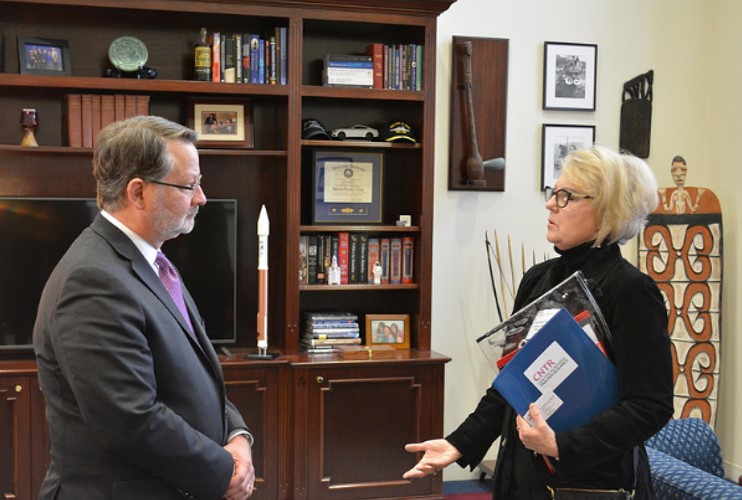WHAT IS ADVOCACY?
Advocacy is a broad term identifying activities that individuals and groups engage in to support a cause or educate elected officials about the importance of an issue in general (such as health care). Such activities include sharing research, inviting a legislator to tour your facility or organization, and working with the media.
Lobbying is a focused form of advocacy aimed at influencing legislation. Asking elected officials to support a specific bill related to health care funding, for instance, is considered lobbying.
Nonprofit organizations are allowed to engage in both broad advocacy and direct lobbying, but nonprofit lobbying activities are defined and guided by IRS rules. (The (h) Election is a special IRS designation that provides clear guidelines to nonprofits about how much money they can spend on lobbying activities. Those not taking the (h) election are governed by more vague rules specifying they can only do an “insubstantial” amount of lobbying.)
FIND YOUR LEGISLATORS
Find your Representative
Find your Senators
INVITE LEGISLATORS TO TOUR YOUR LEVEL 1 TRAUMA CENTER OR UNIVERSITY HOSPITAL SYSTEM
Inviting your members of Congress to tour the trauma center and experience how you serve the public and conduct research is an effective way to advocate for federal funding of trauma research. Make sure to consult with your institution’s or hospital’s federal relations office to coordinate messaging. Look under the “Contact” tab of the legislator’s website to obtain the address and phone number of their closest district office.
Compose an email invitation (see sample below) and send it to the appropriate contact (you may have to call the office to get the name of the correct staff person).
Date
[Name of Staffer, if applicable]
The Honorable [first name, last name]
U.S. House of Representatives [or U.S. Senate]
Address
City/State/Zip
Dear Representative/Senator ______________:
I am writing to invite you and/or members of your staff to visit [district trauma center] during an upcoming Congressional recess. I’d like for you to see first-hand how your constituents who are victims of violence, car crashes, falls and burns are served in our trauma center. And I’d also like to discuss how funding for funding for trauma research supports the healthcare resources in [your state or district] and can save the lives of the people we care for.
Thank you in advance for your consideration of this request. Please contact me at [your email address] or [phone number] to schedule a visit. If I have contacted the wrong person in your office, please refer me to the appropriate staff person so that I may reach out to him or her directly.
Sincerely,
[Your name, institutional affiliation, and contact information with mailing address and email]
MEET WITH YOUR MEMBERS OF CONGRESS
- Be prepared. Review CNTR’s most recent white paper to see what we are currently requesting of Congress.
- Do your homework. Check the members’ website, Twitter feed, Facebook page, and www.congress.gov, to learn about their positions and votes on relevant issues.
- Gather relevant materials. Collect any materials you intend to give to congressional staffers, such as CNTR white papers and state-specific injury statistics from the CDC:
Current CNTR White Paper on a National Trauma Research Action Plan
WISQARS state-level cost of injury statistics - Stay in touch after your visit. Follow-up the visit with an email thanking the member of Congress or staffer for his or her time and briefly summarizing the major issues discussed, including your “ask.” Keep in touch with your legislator through occasional correspondence and visits to the local office; offer to be a resource. Be sure to follow through on any commitments you made to staffers.
- Share your experience. Contact CNTR and let us know about your visit and any actions the office has agreed to. Post to social media with the hashtag: #FundTraumaResearch
GET THE WORD OUT
Letters-to-the-editor (LTE), commentaries, and op-eds can help advocate for research funding and educate the public about trauma care. They are widely read by elected officials, their aides, and people in your community. Here are some tips for writing and submitting a letter or op-ed to your local newspaper.
- Make it relevant. Your letter may have a greater chance of posting if it is in response to an editorial, op-ed, or front page story within 2-3 days of publication. Begin your letter by citing the original story by name, date, and author
- Be concise. The first sentence should summarize your position
- Make it personal. Share your expertise to show you have credibility on the subject matter, and share a personal experience
- Avoid jargon. Spell out any name the first time you use it, followed by the acronym in parentheses
- Make it local. Newspapers prefer to print editorials and letters that address local issues
- Mind your word count. Abide by the requested word limit, guidelines, and rules listed on the website. If no word limit is given, keep it short–250 words or less for LTEs and 750 words or less for op-eds
Sample Letters to the Editor and Op-Eds
Federally funded research is foundation for our future (The San Diego Union-Tribune) – by Dr. Hudson Freeze
Look to the military to fix U.S. trauma care (Baltimore Sun) — by Dr. David Marcozzi
CONNECT ON SOCIAL MEDIA
Comment about the trauma research going on in your facility, celebrate trauma survivors, share opinions. Use the hashtag #FundTraumaResearch any place where appropriate.
Twitter handles for relevant organizations
@NatTrauma (CNTR)
@traumadoctors (AAST)
@EAST_TRAUMA (EAST)
@ACSTrauma (ACSCOT)
ADD YOUR VOICE DURING ANNUAL REOCCURRING OPPORTUNITIES FOR TRAUMA RESEARCH ADVOCACY
February – CNTR’s Trauma Research Advocacy Day in Washington
House and Senate Appropriations Committees begin deliberations on next fiscal year’s budget in February/March each year; CNTR advocates meet with committee members and others to request support for specific programs
March 31 – National Stop the Bleed Day
May – Trauma Awareness Month
June – National Safety Month
Summer – Injuries spike in summer while kids are out of school
November 11 – Veterans Day



